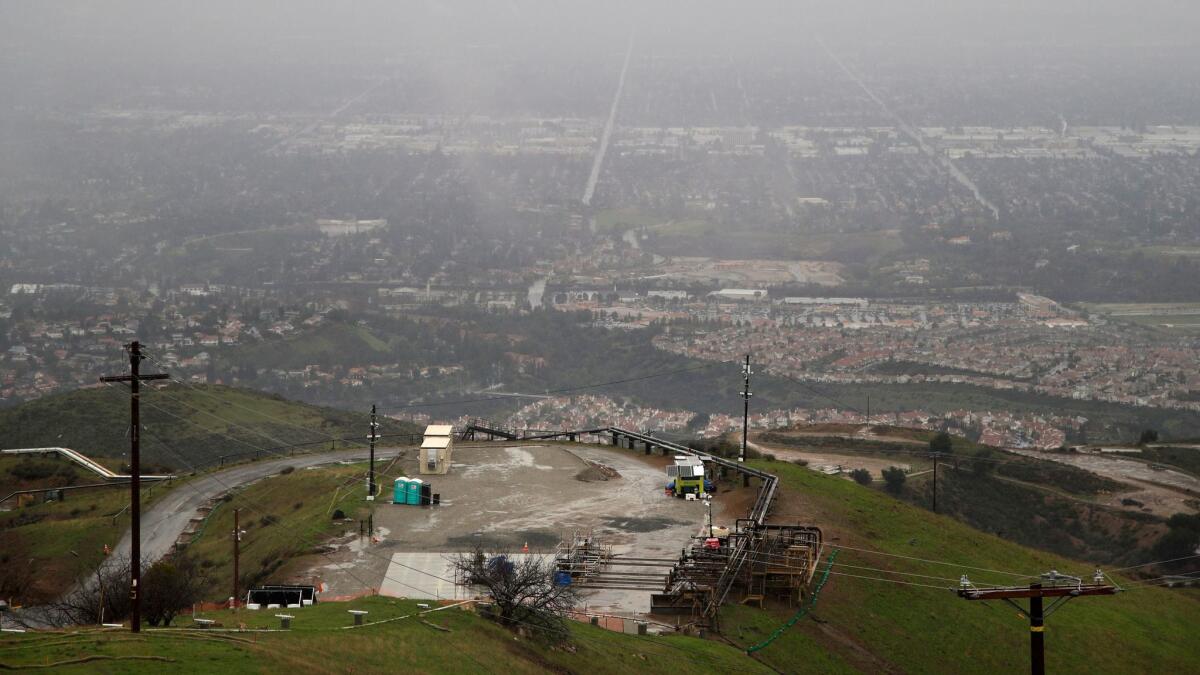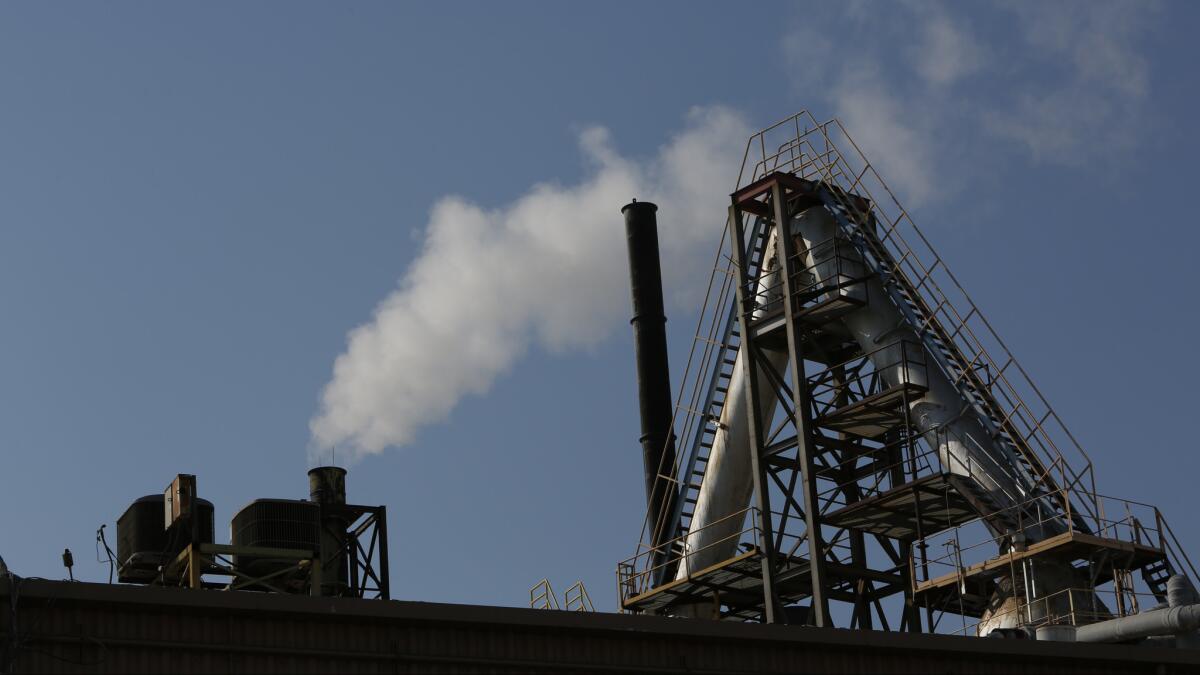Column: Jerry Brown talks a green game. So why isn’t California tougher on these polluters?

- Share via
Do regulators in California have your back when utilities or industries run amok, or when there’s a threat to public health in your neighborhood?
We’d all like to think so, but there’s a long history of coziness between regulators, industry titans and politicians. So you’d have to be a hopeless optimist, or a very trusting soul. And maybe you missed stories about the state Public Utilities Commission’s actions and inactions prior to the deadly 2010 PG&E gas line explosion in San Bruno, or the agency’s botched handling of the San Onofre nuclear plant closure in 2014, in which ratepayers got stiffed.
And two current stories have skeptics wondering whether state regulators are watchdogs or lap dogs.
Still feeling sick
In Porter Ranch, lots of residents just aren’t buying the claim by state regulators that it was safe for the Aliso Canyon natural gas facility to resume limited operations less than two years after the most humongous methane leak in U.S. history forced thousands of residents to relocate for months.
“I’m feeling so sick, I’ve started packing,” said Jane Fowler, a Granada Hills resident who doesn’t even know where she’s going yet.
Fowler is feeling lousy again, like she did for years. Before the big leak, she had attributed her bloating, hair loss, body aches and profuse perspiration to menopause. But each time she traveled out of state, the symptoms disappeared. When she returned home, the symptoms were back.

In Southeast Los Angeles County, where the Exide battery recycling plant spit poison into the air for decades and threatened the health of an estimated 100,000 nearby residents, the state has refused to release thorough information about lead contamination. And of 10,000 properties that may be fouled, only 2,500 are part of a current cleanup plan that’s moving at a snail’s pace.
“Years go by and we’re not getting the information,” Teresa Marquez, president of Mothers of East Los Angeles, said in a story by my colleagues Tony Barboza and Ben Poston. “We don’t even know what houses they’re cleaning.”
A huge toxic scandal
Last year I toured the neighborhoods around the shut-down Exide plant and talked to residents about their fears that lead poisoning will cause — or has already caused — disease, developmental issues and low IQs among children. Some wondered why their low-income, mostly Latino communities were still waiting for help even as Gov. Brown visited the more affluent Porter Ranch and declared an emergency.
The regulatory agency involved in the Exide cleanup is the state Department of Toxic Substances Control, which has withheld key details from soil sampling data requested by The Times, arguing that disclosure would compromise the privacy of residents.
Huh?
As our story noted, “More than half of the households surveyed recently by county health officials reported that they have not received results from the soil testing completed in their yards.”
Like I said last year, this was one of the most shocking cases of corporate malfeasance and regulatory failure in state history, with regulators failing to crack down for decades.
It’s unconscionable that the state still isn’t moving any faster than it is.
Liza Tucker of Consumer Watchdog said people of color often live in areas with more pollution, but the reopening of Aliso Canyon suggests California’s regulatory negligence is colorblind.
“There are big regulatory cracks in the system,” Tucker said. “California is doing a terrible job of protecting people from potential disasters, and the reasons are many, but one major one is regulatory capture. That’s the co-opting of the administration by businesses, and it starts at the top.… You have a situation where the governor has accepted millions of dollars from energy companies that helped … him and legislators get elected and stay elected.”
How green is Brown on these environmental problems?
Consumer Watchdog has long argued that for a guy with such a green reputation, Brown is a good friend to fossil fuel industries. In a news release last week, Tucker charged that numerous decisions by the Brown administration have boosted stock at Sempra Energy, where his sister Kathleen has profited handsomely as a board member. Tucker noted that SoCalGas, a subsidiary of Sempra, got the go-ahead from Brown-appointed regulators at the PUC and the state Division of Oil, Gas, and Geothermal Resources to reopen its Aliso Canyon facility.
“That place has been opened without proper environmental or seismic testing,” said Tucker. “We should not have human beings living on top of a natural gas time bomb.”
She disputed the state’s argument that Aliso is critical to maintaining power availability in the region, saying Aliso provides convenient storage for gas that is bought when prices are low and sold when prices spike.
Brown spokesman Evan Westrup wasn’t buying any of it. He called the conflict-of-interest claim involving the governor’s sister baseless. Westrup also said that in the spirit of the governor’s climate change target, Brown has asked the chair of the state Energy Commission to begin planning for the eventual closure of Alison Canyon. In the meantime, Westrup said, the approval for limited operation of Aliso was guided by “facts, science, objective analysis” and the “focus is the health and safety of residents, period.”
A PUC statement listed numerous tests and safety precautions that were instituted before allowing the facility to resume operating “at greatly reduced capacity.”
“While these aggressive new safety protocols take effect,” said the statement, “the independent investigation into the cause of the … leak continues.”
So what’s the rush?
But why not finish that investigation first?
That’s what L.A. County officials wanted to know, and as my colleague Nina Agrawal reported, that very question was central to a lawsuit the county filed against the state and the gas company.
“The reopening of the facility is highly troubling and irresponsible,” said the complaint. “This is a regulator rushing to approve reopening without completing necessary investigations and risking public health.”
L.A. County Supervisor Kathryn Barger was in full agreement, saying some of the residents have continued to complain about headaches, nausea, bloody noses and other ailments.
“We need to know what the root cause is,” Barger told me. “I just don’t know what the rush was.”
Maybe the answer is as simple as this:
Time is money.
Get more of Steve Lopez’s work and follow him on Twitter @LATstevelopez
ALSO
My close encounter with a shark got me out of the water — but not for long
The mystery homeless woman of Pacific Palisades and the village that helped her home
Yet another USC scandal requires blunt talk about money culture and values on campus
More to Read
Sign up for Essential California
The most important California stories and recommendations in your inbox every morning.
You may occasionally receive promotional content from the Los Angeles Times.













